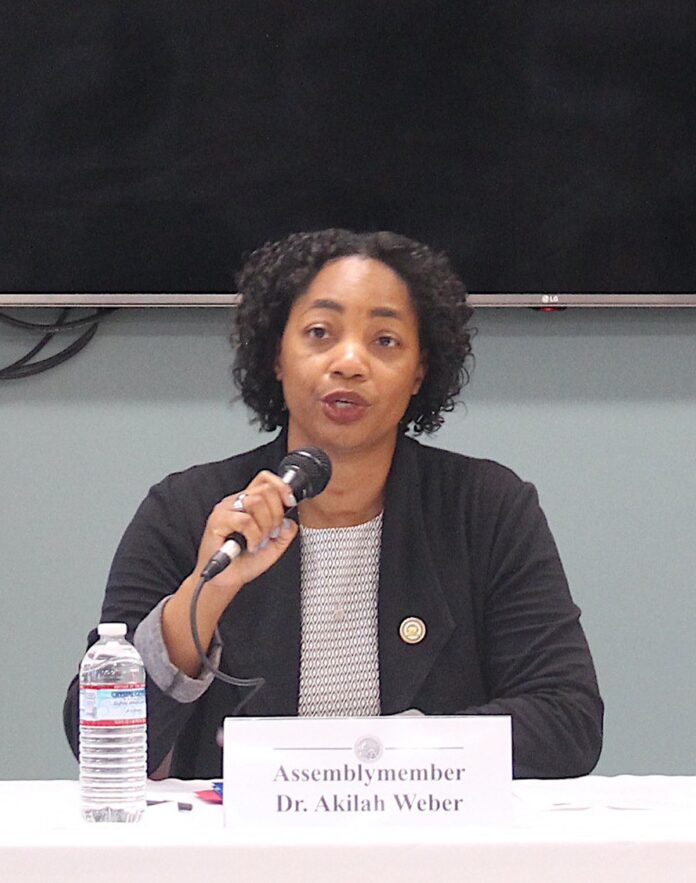On Jan. 17, Assembly member Dr. Akilah Weber, 79th Assembly District, held a virtual town hall meeting to discuss the governor’s proposed 2024/25 proposed budget with a looming nearly $38 forecasted billion deficit. She said this is about $30 million lower than reported by the Legislative Analyst’s Office in December.
“As the new chair of the Assembly Budget Subcommittee 1, which focuses on budget health, the budget discussion overall is particularly important to me,” she said. “The primary jurisdictions of this committee include budget and fiscal policies affecting MediCal, mental health, substance abuse, and public health, the oversight of the budgets of the departments of healthcare access and information, healthcare
services, managed care, public health, state hospitals, Covered California, the Emergency Services Authority, and the Mental Health Services Oversight and Accountability Commission.”
Assembly Budget Committee Chief Consultant Christian Griffith said the largest portions of revenue for the general budget are motor vehicle fees and personal income tax. He said it is important to understand the timeline of the budget. On Jan. 10, the governor released his budget proposal. April 15 is the 2023 tax deadline. June 15 is the deadline for Legislature to pass a budget, which must be completed by the start of the 2024-25 fiscal year on July 1.
“Once tax revenues are released for 2023, the governor will adjust the proposal to make sure it fits within the revenues,” he said. “That is a critical dating point coming up, and we have about a month after that to pass a budget in the Legislature.”
Griffith said the Legislature has the power of appropriation of the budget and the governor’s proposed budget is a starting point for the Legislature. He said the governor can veto parts of the budget, but he cannot add money to the budget. He said the process in the Assembly, every vote must be taken in public, on television, with an expected 80 hearing over the next few months to allow the public to participate.
He said there are seven budget committees in the Assembly working concurrently on this budget.
Griffith said before the pandemic the state had a steady stream of revenue, and was able to predict the budget more accurately. He said during the pandemic it was difficult to predict the incoming revenue for the budget but that 2021 was one of the best years on record for the economy.
“Coming out of that 2020 lockdown, it was unprecedented,” he said. “In the U.S., there were a million new millionaires created that year. Our revenues skyrocketed up.”
Griffith said they understood that this was not sustainable, so they assumed some of that money would not come back in 2022 and 2023. He said they assumed it would gradually fall back, but it became a dramatic drop from about $215 billion to $172 billion fast.
“We did not know that we did not have this money all last year, because as many of you know, the IRS made the decision to delay tax payments,” he said. “Normally we would have gotten tax payments in April 2023 for the 2022 year, but we did not get that information until a couple of weeks ago because the tax deadline was extended all the way into November. We thought we had a $100 billion surplus for two years in a row, when we had a $60 billion surplus.”
Griffith said they have this problem now, and they expect the state will be spending $30 billion more than the state is taking in on the budget in the in the next two to three years. He said being a structural problem is more difficult than filling a one-time budget deficit.
“Hopefully, if the tax deadline is not extended again, in April this year we will have really good tax numbers and a much finer tuned idea of what this budget hole really is,” he said. “I am not confident that the numbers that we are looking at now are a good judge of that. That makes it a little bit difficult because we are waiting to decide what to do with these cuts and proposals when we do not really know how big the problem is. We may have to pivot dramatically when we get to May.”
Griffith said by May they could find out that things are much worse, but it is just as likely that they will find that things are much better than expected, but they must prepare for both circumstances.
Griffith said in the proposed budget, there are some major reductions: $2.9 billion in various climate programs, $1.2 billion in various housing programs, $762.5 million in eliminating vacant positions, $500 million in school facilities, $494 million in student housing revolving loan, $350 million in legislative member budget priorities, $300 million UCLA Immunology Institute, and $289 million in the Middle Class
Scholarship.
Proposed budget delays include: $2 billion for transit capital projects, $613 million DDS Rate Reform, $550 million TK/ preschool/kindergarten facility grants, $400 million Clean Energy Reliability Investment Plan, $235 million Behavioral Health Bridge, and $175 million Vulnerable Community Toxic Clean Up.
When asked if the deficit would increase taxes, he said the only changes in taxes would be changing the Managed Care Organization Tax structure to increase revenue by $3.8 billion, conforming to federal tax cuts and Jobs Act net operating loss limitation resulting in $300 million in new revenue, and close some tax credits for oil and gas companies, resulting in $22 million in total revenue.
Griffith said in hidden cuts, many state rates and wages could be frozen or increased by less than inflation, major issues in the MediCal system, labor issues at the state and other entities such as California State Universities, and some onetime expenditures could be cut such as the Low Income Housing Credit and the Local Homeless funding past 2025.
“In terms of San Diego and district cuts, hopefully if the budget stays where it is, we can find a way to mitigate that over time and try to make sure that the impact to the district is blunted,” he said.
Griffith said the continuing ongoing budget deficit predicted is a problem, but they are waiting until they see what the tax revenues are for 2023.
“We absolutely have to fix the structural deficit,” he said. “Right now, the number suggest that it is around $30 billion. Given the volatility of California, the global economy and how things have been changing, it is possible that the structural deficit could be $5 billion or $40 billion. It is not a fantastic place to be, but it is nowhere as dire as the Great Recession.”
California ranks as the fifth largest economy in the world with a $3.8 trillion gross state product as of 2023, the largest sub-national economy in the world.














